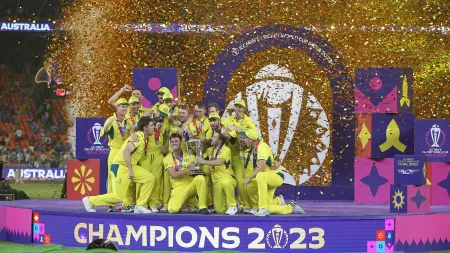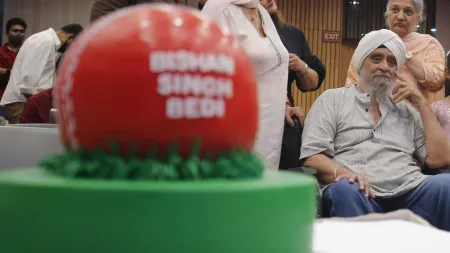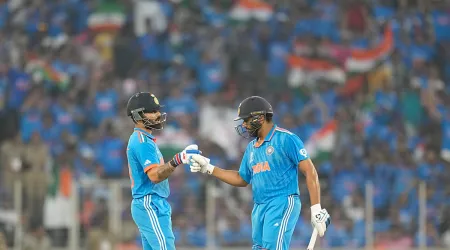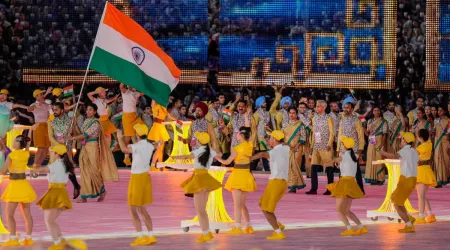- India
- International
Hippos drowning in swamps, dinner plans: What do chess players think of when they allow their mind to wander during games
When a classical game stretches on for 5 or 6 hours, chess players allow the occasional butterfly of whimsical distraction to fly into the dungeon of their minds. Here are the oddest thoughts chess players like Tal, Anand, Gukesh, Vachier-Lagrave and Grischuk entertained in the middle of games.
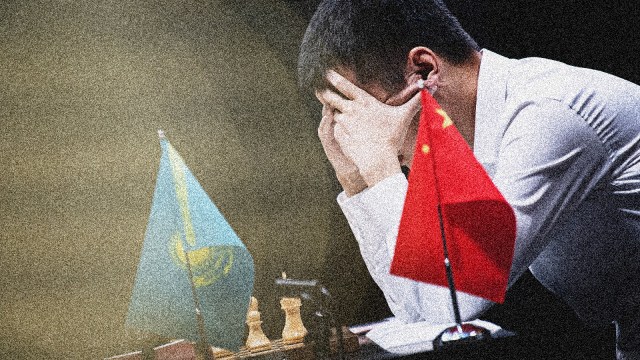 Candidates 2024: What do chess players think of when they allow their mind to wander during long classical games? Some of the world's top grandmasters provided an insight into the oddest thought that came into their mind during games. (PHOTO: FIDE/ Stev Bonhage)
Candidates 2024: What do chess players think of when they allow their mind to wander during long classical games? Some of the world's top grandmasters provided an insight into the oddest thought that came into their mind during games. (PHOTO: FIDE/ Stev Bonhage)Mikhail Tal was helpless. The 8th world chess champion, who had earned a reputation for being one of the most attacking players ever to sit on a chess board, was unable to figure out an escape plan. There seemed to be no spell the man nicknamed the Magician of Riga could perform and make his problem vanish in thin air. There was a hippo drowning in a swamp, but the Soviet chess legend was out of ideas to rescue the hapless animal.
FOLLOW OUR LIVEBLOG OF ROUND 1 OF CANDIDATES CHESS TOURNAMENT
Fortunately, the distressed animal was only a figment of Tal’s imagination. Unfortunately, the entirely made-up hippo was occupying valuable real estate in Tal’s mind while he was in the middle of a classical chess game against GM Vasiukov during the USSR Chess Championship.
“My son must have been three years old at the time. And he enjoyed me reading out bits from Korney Chukovsky’s (Russian children’s poet) books. I was playing in some tournament, and for no reason, I thought of the following words from Chukovsky’s works: ‘Oh, what a difficult job it was, to drag the hippopotamus out of the marsh.’ I was carefully looking at the chess board. But all I could picture was the hippo, stuck in the marsh,” Tal recollected in the 2006 documentary called Queen Sacrifice many years later.
Like his fictitious hippo, Tal’s horse was in trouble on the chess board. So Tal hunkered down, evaluating his options to save, not the distressed knight, but the hippo. At some point, he considered and then rejected the idea of using jacks, levers, a rope ladder. Even a helicopter was conjured at one point.
“Although spectators were convinced that I was continuing to study the position, I was trying to work out: just how would you drag a hippopotamus out of the marsh? After a lengthy consideration I admitted defeat as an engineer, and thought spitefully to myself: ‘Well, just let it drown!’ Suddenly the hippopotamus disappeared. Immediately, the position on the chess board got uncomplicated. I realized that the knight sacrifice was necessary. The following day, it was with pleasure that I read in the newspaper how Mikhail Tal, after carefully thinking over the position for 40 minutes, made an accurately calculated piece sacrifice.”

Chess players can’t help but get distracted during games
At the ongoing Candidates chess tournament, no matter how high the stakes, players will allow the occasional butterfly of whimsical distraction to fly into the dungeon of their minds.
Not just Tal, many grandmasters have allowed their minds to take a stroll in the middle of a classical game, because it is simply impossible to concentrate on a chess game for five or six straight hours. Some games can stretch even longer: for example, game 6 of the 2021 world chess championship battle between Magnus Carslen and Ian Nepomniachtchi lasted for seven hours and 47 minutes.
Current world no 19 Maxime Vachier-Lagrave had told The Indian Express last year at the Tata Steel Kolkata event that he sometimes catches himself in the middle of long games chuckling at jokes his friends have said the day before.
Another elite-level grandmaster, Russia’s Alexander Grischuk, had told The Indian Express: “There have been some strange things happening in my mind during games. I cannot remember anything as interesting as Tal’s hippos. But of course you have random thoughts during classical games. You sing some songs in your head. If you’re playing blitz, it’s possible to focus on just the game. But it’s impossible to push these thoughts away from the mind in classical games. You cannot be in a state of total concentration for six hours. It’s not even beneficial.”
When the mind goes on strike
“Whenever somebody tells me, ‘I don’t know how you concentrate for seven hours,’ I understand that they don’t know how we play chess. Or that they haven’t played chess themselves because we do not concentrate for seven hours. Very few people do it. I would think even the brain simply goes on strike periodically and then comes back. I think that’s how it works,” chess legend Viswanathan Anand had said on the Conversations with Tyler podcast.
When the host Tyler Cowen asked Anand what he thought of at such distracted moments, the five-time world champion said: “During a match, even in very critical moments, I’ll be thinking what I can have for dinner. What I should have done yesterday. ‘Oh, I met that jerk yesterday.’ This kind of stuff. Your brain wanders off. It’s almost like taking your foot off the gas. Your brain wants to wander off for a while. You let it, and then you come back. Or you keep one part focused on what’s happening, but while your opponent is thinking you can wander off.”
Grzegorz Gajewski, who is the trainer of 17-year-old Gukesh, had recounted a funny incident of the teenaged player during an interview with The Indian Express last year.
At the Tata Steel Chess Masters event in Wijk Aan Zee last year, Gukesh was constantly finding himself in time trouble. He even lost a game to Wesley So, despite holding the edge at one stage because his time management forced him to make errors at the end.
“Just before he was going to face Magnus Carlsen, I came up with a unique solution for his time management issues: I offered to do 10 push ups for every minute he saved on the clock. I told him he had to have a certain amount of time on the clock (in the game against Carlsen) after move 30 or something. If he wasn’t able to do that, he would do 10 push ups,” Gajewski had recounted.
“His time management with Carlsen was perfect! It felt like he was literally trying to punish me! He even told me later that at some point during the game he started counting push-ups I would have to do. He drew the game very comfortably.”
So the next time you watch chess players staring at the board with rock-hard concentration, it might just be them entertaining the thought of punishing their coaches. Or figuring out their dinner plans. Or just wondering how to save fictitious fauna.









